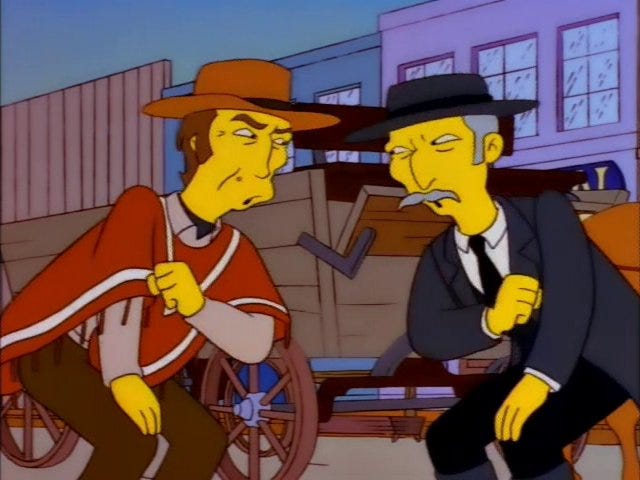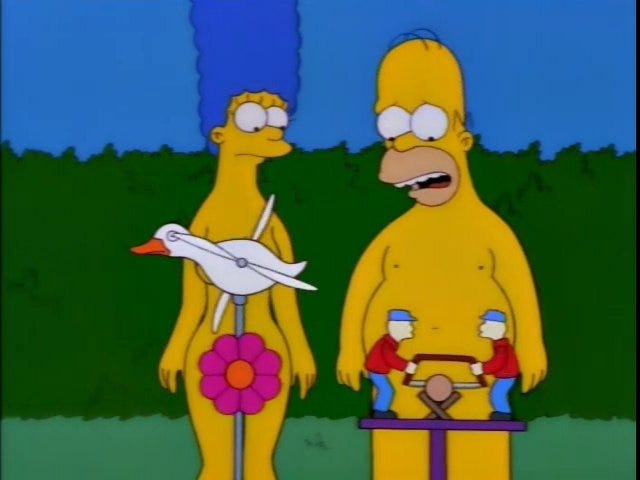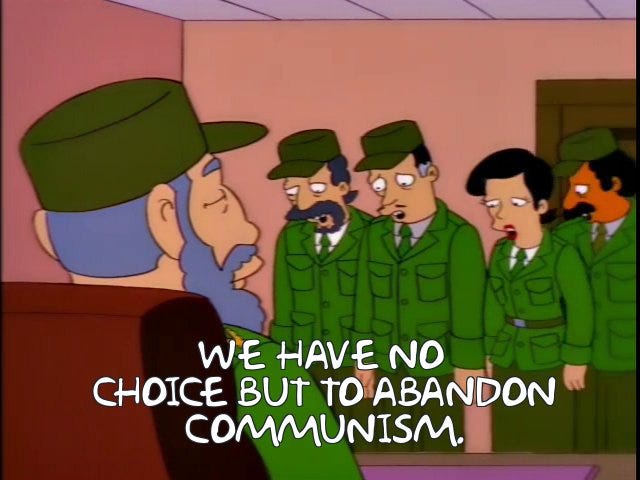The bad news: Season Nine dips about as low as the show has ever dipped (so far).
For the first time, this season performs worse than the one before it in every single category on the CLASSIC scale. And some of the steps backwards aren’t small ones. Beyond this, the third worst episode of the series (so far) rears its ugly head, and it’s the worst episode since Season One. You know the one.
But the good news matters, too: it’s still a great season that hits way more frequently than it misses.
Despite only one episode entering the Top 25, nine enter the Top 50. By capturing 18% of the Top 50, Season Nine matches Seasons Six and Eight and, other than Season Five, beats the rest. Not bad! Turns out coming down to earth from one of the funniest seasons of one of the funniest shows of all time really isn’t catastrophic.
TLDR; it’s an imperfect season, but don’t listen to the naysayers who say it can be skipped. Season Nine still stands out as a great season of The Simpsons. Here’s why.
There are 25 episodes in Season Nine of The Simpsons. In this post, you’ll first find the CLASSIC Scale episode score for each, listed from best to worst. Then, I’ll take a closer look at three individual category scales titled The Good, The Bad, and The Inconsistent.
ICYMI: I explain my method here. This is the master document, containing my up-to-date all-time rankings list.
Excellent (A)
Trash of the Titans
Girly Edition
Bart Carny
Lisa’s Sax
Das Bus
This Little Wiggy
The Trouble With Trillions
Lisa the Simpson
The Cartridge Family
Simpson Tide
Great (A-)
Joy of Sect
The Two Mrs. Nahasapeemapetilons
Natural Born Kissers
Treehouse of Horror VIII
Realty Bites
The City of New York vs. Homer Simpson
Bart Star
Lisa the Skeptic
The Last Temptation of Krust
Lost Our Lisa
Very Good (B+)
King of the Hill
Good (B)
Dumbbell Indemnity
Almost Good (C+)
Miracle On Evergreen Terrace
Adequate (C)
All Singing, All Dancing
Marginal (D+)
The Principal and the Pauper
Season Eight Rankings
Average Category Score + (Change from S8 → S9):
Characters: 8.08 (-0.36)
Laughs: 8.20 (-0.29)
Artistry: 8.36 (-0.23)
Story: 7.93 (-0.47)
Setting: 8.19 (-0.19)
Irreverence: 8.09 (-0.27)
Classic-ness: 8.19 (- 0.34)
Total: 8.15 (-0.31)
Average Episode Score: A-
(by mean and by median)
Improved Categories from S8:
None
Steepest Fall:
Story
If we consider a Top-Tier(s) Episode to be an A or an A+, this is how frequently they come through over the “prime” seasons:
S3: 3/24 = 8%
S4: 8/22 = 36%
S5: 11/22 = 50%
S6: 13/25= 52%
S7: 7/25 = 28%
S8: 13/25 = 52%
S9: 10/25= 40%
I’ll try to keep this brief.
Analyzing Season Nine might seem like a rollercoaster, but the lows are too low for that. It’s more like a lot of short fun rides interrupted by lame rides and line-ups and maybe even getting ripped off by a carny every now and then.
For the first time since Season Three, we’ve got zero Incredible episodes (that’s bad). On the other hand, there are ten excellent episodes (that’s good). Unfortunately, the season also includes the worst episode since Season One, earning the series’ first D+ and ranking as the third worst episode overall… so far (also bad). There are also a higher number of episodes ranked below a B- (aka anything in the range of Cs, Ds, and Fs) than any season since Season Two (that’s really bad).
If I had to put my finger on one troubling trend from Season Nine, it might be that there is next-to-no consistency— not just in quality, but in tone. Here I’ll quickly look at the season’s highest category, lowest category, and most varied.
The Good: Artistry
In your average Simpsons season, the clip show is the lowest point. In this season, it’s only the second worst! Partially, that’s because Principal and the Pauper is a crime against nature. But also, it’s because the clip show goes beyond the format’s usual frustrations by giving us some fresh, original tunes. It’s not just the musical clip show, though. “Those Were The Days,” “I’m Checkin’ In,” “The Garbage Man Can,” and the Canyonero songs are some of the most iconic musical moments of the entire series’ history. Often, my notes say things like “well, it’s not very funny, but the artistry is good.” And that can mean basically anything— weirdly beautiful animation, transcendent flashbacks and dream sequences, perfect scoring, exceptional voice acting, randomly hilarious Itchy & Scratchy episodes. The show executes little details in surprisingly creative ways— like Homer and Marge’s awkward stumble of a failed sex scene under the covers in the season finale, or the iconic nude mini golf scene when they’re on the run.
The Bad: Story
There’s some real dead weight pulling this category down. The Principal and The Pauper, when we learn Seymour Skinner isn’t actually Seymour Skinner, scored a D-. I really tried to go in open-minded, but my notes say there’s “something genuinely aggravating” about this storyline, and those notes are right. It’s a bad story and it’s not funny.
Now, there are also episodes like Realty Bites, where my impression was: “story is incredibly dumb…. but that’s OK?” It’s true, right? We don’t watch The Simpsons for the stories, and if an episode is funny enough, we won’t really feel cheated if the story was nonsensical or loosely tied up or had a haphazard logic devoid of cause and effect. But in Season Nine, the show starts playing with fire. Although through its prime the show proudly plays with story structures where you could never predict the second act by how the first begins, a troubling trend starts to set in where entire scenes of the first act feel useless and inconsequential and- most importantly- not funny enough to justify themselves. In Dumbbell Indemnity, Moe starts dating a woman and overspends to impress her. The episode delivers an OK story with OK laughs and ranks 179th out of the 203 I’ve watched so far.
That’s not to say there isn’t still good storytelling in this season. An episode like Das Bus is excellent not only for going deep into the Lord of the Flies tribalism on the kid plot, but also giving us Homer’s online business (CompuGlobalHyperMegaNet), which ends up posing enough of a threat to Bill Gates that he has his goons put Homer out of business. Excellent B Plot.
The Inconsistent: Irreverence
For me Irreverence, loosely, refers to the social commentary, the satire, the parody, and the general lampooning of American culture at large or its specific problems. Not every episode of the show needs this, of course. But when it does this well, it does it about as good as any institution in television history. And this season hits all the usual targets adeptly— the school system, the police, the church and organized religion in general, the nuclear family, the television and entertainment industry, etc.
I’m pretty sure this stretch marks the sharpest, highest-scoring four-episode run in this category (not gonna check—lazy): Simpson Tide, where Homer joins the naval reserve; The Trouble With Trillions, where he betrays the FBI to help Burns flee the country; Girly Edition, where Bart turns Lisa’s news show into a circus; and Trash of the Titans, where Homer exposes democracy’s flaws and runs sanitation into the ground.
But many other episodes fall flat. In some episodes, the show lacks any sort of bite whatsoever. That’s fine now and then, but it does create a sense of emptiness when other elements of the show aren’t firing on all cylinders. In others, they lay it on too thick and don’t actually make a meaningful or funny criticism. An example would be King of the Hill, where the show skewers the energy bar industry and advertising itself, I guess? None of it is particularly funny, nor potent.
The season’s main issue is inconsistency, and that’s captured pretty good by tracking this category. The distance between most incisive critique and socio-political impotence is a wide one and Season Nine covers the range.









